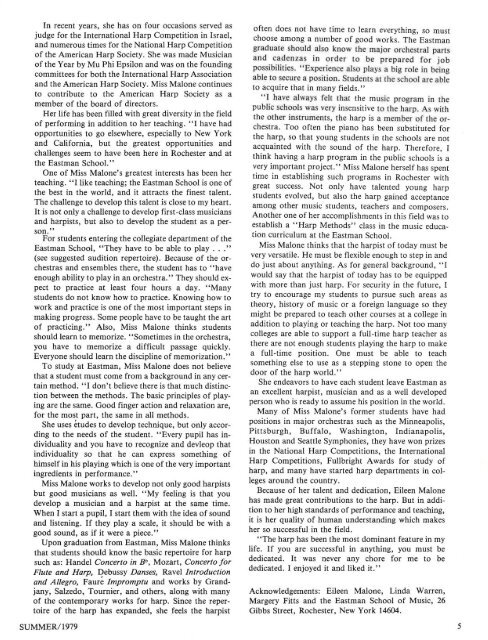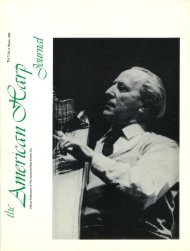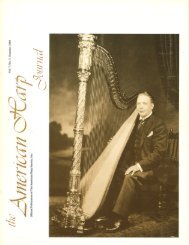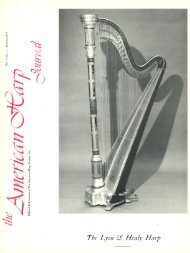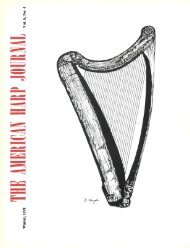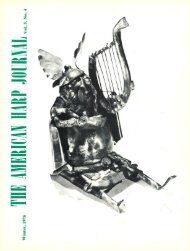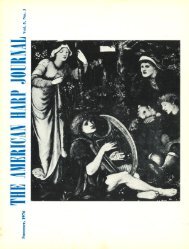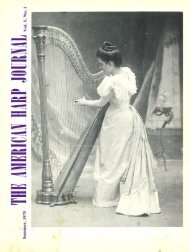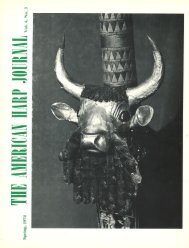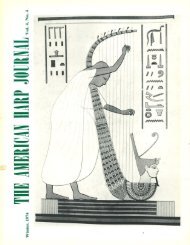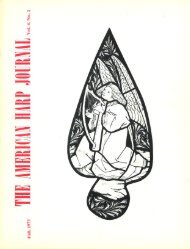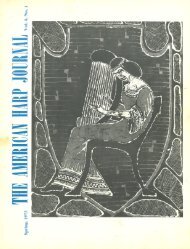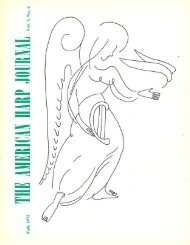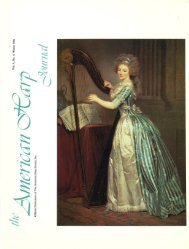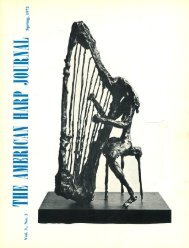AHJ, Vol. 7 No. 1, Summer 1979
AHJ, Vol. 7 No. 1, Summer 1979
AHJ, Vol. 7 No. 1, Summer 1979
Create successful ePaper yourself
Turn your PDF publications into a flip-book with our unique Google optimized e-Paper software.
In recent years, she has on four occasions served as<br />
judge for the International Harp Competition in Israel,<br />
and numerous times for the National Harp Competition<br />
of the American Harp Society. She was made Musician<br />
of the Year by Mu Phi Epsilon and was on the founding<br />
committees for both the International Harp Association<br />
and the American Harp Society. Miss Malone continues<br />
to contribute to the American Harp Society as a<br />
member of the board of directors.<br />
Her life has been filled with great diversity in the field<br />
of performing in addition to her teaching. "I have had<br />
opportunities to go elsewhere, especially to New York<br />
and California, but the greatest opportunities and<br />
challenges seem to have been here in Rochester and at<br />
the Eastman School.''<br />
One of Miss Malone's greatest interests has been her<br />
teaching. "I like teaching; the Eastman School is one of<br />
the best in the world, and it attracts the finest talent.<br />
The challenge to develop this talent is close to my heart.<br />
It is not only a challenge to develop first-class musicians<br />
and harpists, but also to develop the student as a person.''<br />
For students entering the collegiate department of the<br />
Eastman School, "They have to be able to play . .. "<br />
(see suggested audition repertoire). Because of the orchestras<br />
and ensembles there, the student has to "have<br />
enough ability to play in an orchestra.'' They should expect<br />
to practice at least four hours a day. "Many<br />
students do not know how to practice. Knowing how to<br />
work and practice is one of the most important steps in<br />
making progress. Some people have to be taught the art<br />
of practicing." Also, Miss Malone thinks students<br />
should learn to memorize. "Sometimes in the orchestra,<br />
you have to memorize a difficult passage quickly.<br />
Everyone should learn the discipline of memorization."<br />
To study at Eastman, Miss Malone does not believe<br />
that a student must come from a background in any certain<br />
method. "I don't believe there is that much distinction<br />
between the methods. The basic principles of playing<br />
are the same. Good finger action and relaxation are,<br />
for the most part, the same in all methods.<br />
She uses etudes to develop technique, but only according<br />
to the needs of the student. "Every pupil has individuality<br />
and you have to recognize and devleop that<br />
individuality so that he can express something of<br />
himself in his playing which is one of the very important<br />
ingredients in performance.''<br />
Miss Malone works to develop not only good harpists<br />
but good musicians as well. "My feeling is that you<br />
develop a musician and a harpist at the same time.<br />
When I start a pupil, I start them with the idea of sound<br />
and listening. If they play a scale, it should be with a<br />
good sound, as if it were a piece."<br />
Upon graduation from Eastman, Miss Malone thinks<br />
that students should know the basic repertoire for harp<br />
such as: Handel Concerto in B b, Mozart, Concerto for<br />
Flute and Harp, Debussy Danses, Ravel Introduction<br />
and Allegro, Faur~ Impromptu and works by Grandjany,<br />
Salzedo, Tournier, and others, along with many<br />
of the contemporary works for harp. Since the repertoire<br />
of the harp has expanded, she feels the harpist<br />
often does not have time to learn everything, so must<br />
choose among a number of good works. The Eastman<br />
graduate should also know the major orchestral parts<br />
and. c_~d_e nz~,s in ? rder to be p repared fo r job<br />
poss1b1ht1es. Expenence also plays a big role in being<br />
able to secure a position. Students at the school are able<br />
to acquire that in many fields."<br />
"l_ have always felt that the music program in the<br />
public sch?ols was very in ensitive to the harp. A with<br />
the other instruments, the harp is a mem ber of the orchestra.<br />
Too often the piano has been substituted for<br />
the harp, so that young students in the schools are not<br />
acquainted with the sound of the harp. Therefore I<br />
think having a harp program in the public schools i; a<br />
~ery i~portant project.'' Miss Malone herself has spent<br />
time m establishing such programs in Rochester with<br />
great success. <strong>No</strong>t only have talented young harp<br />
students evolved, but also the harp gained acceptance<br />
among other music students, teachers and composers.<br />
Another one of her accomplishments in this field was to<br />
establish a "Harp Methods" class in the music education<br />
curriculum at the Eastman School.<br />
Miss Malone thinks that the harpist of today must be<br />
very versatile. He must be flexible enough to step in and<br />
do just about anything. As for general background, "I<br />
would say that the harpist of today has to be equipped<br />
with more than just harp. For security in the future, I<br />
try to encourage my students to pursue such areas as<br />
theory, history of music or a foreign language so they<br />
might be prepared to teach other courses at a college in<br />
addition to playing or teaching the harp. <strong>No</strong>t too many<br />
colleges are able to support a full-time harp teacher as<br />
there are not enough students playing the harp to make<br />
a full-time position. One must be able to teach<br />
something else to use as a stepping stone to open the<br />
door of the harp world.''<br />
She endeavors to have each student leave Eastman as<br />
an excellent harpist, musician and as a well developed<br />
person who is ready to assume his position in the world.<br />
Many of Miss Malone's former students have had<br />
positions in major orchestras such as the Minneapolis,<br />
Pittsburgh, Buffalo, Washington, Indianapolis,<br />
Houston and Seattle Symphonies, they have won prizes<br />
in the National Harp Competitions, the International<br />
Harp Competitions, Fullbright Awards for study of<br />
harp, and many have started harp departments in colleges<br />
around the country.<br />
Because of her talent and dedication, Eileen Malone<br />
has made great contributions to the harp. But in addition<br />
to her high standards of performance and teaching,<br />
it is her quality of human understanding which makes<br />
her so successful in the field.<br />
"The harp has been the most dominant feature in my<br />
life. If you are successful in anything, you must be<br />
dedicated. It was never any chore for me to be<br />
dedicated. I enjoyed it and liked it."<br />
Acknowledgements: Eileen Malone, Linda Warren,<br />
Margery Fitts and the Eastman School of Music, 26<br />
Gibbs Street, Rochester, New York 14604.<br />
SUMMER/<strong>1979</strong><br />
5


